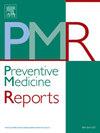Caregiver worry about COVID-19 as a predictor of social mitigation behaviours and SARS-CoV-2 infection in a 12-city U.S. surveillance study of households with children
IF 2.4
3区 医学
Q2 PUBLIC, ENVIRONMENTAL & OCCUPATIONAL HEALTH
引用次数: 0
Abstract
Objective
Understanding compliance with COVID-19 mitigation recommendations is critical for informing efforts to contain future infectious disease outbreaks. This study tested the hypothesis that higher levels of worry about COVID-19 illness among household caregivers would predict lower (a) levels of overall and discretionary social exposure activities and (b) rates of household SARS-CoV-2 infections.
Methods
Data were drawn from a surveillance study of households with children (N = 1913) recruited from 12 U.S. cities during the initial year of the pandemic and followed for 28 weeks (data collection: 1-May-2020 through 22-Feb-2021). Caregivers rated how much they worried about family members getting COVID-19 and subsequently reported household levels of outside-the-home social activities that could increase risk for SARS-CoV-2 transmission at 14 follow-ups. Caregivers collected household nasal swabs on a fortnightly basis and peripheral blood samples at study conclusion to monitor for SARS-CoV-2 infections by polymerase chain reaction and serology. Primary analyses used generalized linear and generalized mixed-effects modelling.
Results
Caregivers with high enrollment levels of worry about COVID-19 illness were more likely to reduce direct social contact outside the household, particularly during the U.S.'s most deadly pandemic wave. Households of caregivers with lower COVID-19 worry had higher odds of (a) reporting discretionary outside-the-home social interaction and (b) SARS-CoV-2 infection.
Conclusions
This was, to our knowledge, the first study showing that caregiver COVID-19 illness worry was predictive of both COVID-19 mitigation compliance and laboratory-determined household infection. Findings should inform studies weighing the adaptive value of worrying about infectious disease outbreaks against established detrimental health effects.
在美国12个城市对有孩子的家庭进行的一项监测研究中,看护者担心COVID-19是社会缓解行为和SARS-CoV-2感染的预测因素
目的了解COVID-19缓解建议的遵守情况对于为控制未来传染病暴发提供信息至关重要。这项研究验证了这样一个假设,即家庭照顾者对COVID-19疾病的担忧程度越高,就意味着(a)整体和可自由支配的社会接触活动水平越低,(b)家庭SARS-CoV-2感染率越低。方法数据来自一项监测研究,该研究在大流行的头一年从美国12个城市招募有孩子的家庭(N = 1913),并进行了28周的随访(数据收集:2020年5月1日至2021年2月22日)。护理人员评估了他们对家庭成员感染COVID-19的担忧程度,随后在14次随访中报告了可能增加SARS-CoV-2传播风险的家庭外社交活动水平。护理人员每两周采集一次家庭鼻拭子,并在研究结束时采集外周血样本,通过聚合酶链反应和血清学监测SARS-CoV-2感染。初步分析采用广义线性和广义混合效应模型。结果对COVID-19疾病担忧程度高的护理人员更有可能减少家庭以外的直接社会接触,特别是在美国美国最致命的流行病浪潮。对COVID-19担忧程度较低的护理人员家庭(a)报告可自由支配的家庭外社交活动和(b)感染SARS-CoV-2的几率更高。据我们所知,这是第一项研究表明,护理人员对COVID-19疾病的担忧既可以预测COVID-19缓解依从性,也可以预测实验室确定的家庭感染。研究结果应该为权衡担心传染病爆发对确定的有害健康影响的适应价值的研究提供信息。
本文章由计算机程序翻译,如有差异,请以英文原文为准。
求助全文
约1分钟内获得全文
求助全文
来源期刊

Preventive Medicine Reports
Medicine-Public Health, Environmental and Occupational Health
CiteScore
3.90
自引率
0.00%
发文量
353
 求助内容:
求助内容: 应助结果提醒方式:
应助结果提醒方式:


